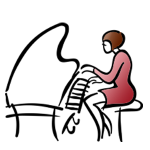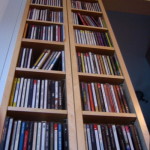Students who are new to music appreciation have a number of vocabulary challenges to deal with. Music terminology, like language in general, has developed over hundreds of years with input from vast numbers of temperamental artsy types speaking several different languages. Terms have been created ad hoc, and often remain in use for the sake of tradition and continuity; if that means that logic and intuitive clarity fall by the wayside, well, that’s showbiz! 😉
A common mistake for students writing about music for the first time concerns the spelling and pronunciation of the lowest instrument or voice part in an ensemble, whose name is spelled like a fish but pronounced like a foundation: the bass. Many students write ‘base’ instead, which, like so many things in life, is logical but incorrect. When students ask me why I want to make their lives so difficult, I usually explain that the English word ‘bass’ is derived from the Italian word basso, so it isn’t pronounced in the English manner. But you know what? I have to confess that I’m all wet on that one, because basso is pronounced BAH-so, not BAY-so, so in order for my explanation to make sense, I would have to pronouce the English term to rhyme with ‘boss’. And then, after practicing my bahss viol, I could go visit my Ahnt, and bring her some flowers, which she would put in a Vahze.
No, no, no!
Click Mr. Readmore to sort it all out, dahling!
I wanted to see if I could get to the bottom of this, so I set off to consult the Great Oracle of Oxford, a.k.a The New Grove Dictionary of Music and Musicians. (The online version requires a subscription, which most university libraries and some public libraries have. Many libraries have the dead tree version as well.)
The entry for Bass starts out with a standard definition: “The lower part of the musical system, as distinguished from the treble…” blah, blah, blah, okay, we know that already. But then, a little further down:
‘Bass’ is cognate with the adjective ‘base’ (‘low’, ‘unrefined’), both deriving from Late Latin ‘bassus’ (‘low’, ‘thick’, ‘fat’).
Now we’re getting somewhere, sort of — ‘bass’ and ‘base’ derive from the same Latin word. Let’s keep going:
The term first appeared in music about the middle of the 15th century… By 1500 ‘Bassus’ alone was used as a noun, meaning the lowest part in a composition. In this new sense it rapidly acquired two cognates, one material, the other figurative: the nouns ‘base’ (‘lowest or supporting part’) and ‘basis’ (‘main constituent’, ‘fundamental principle’). Thus Glarean’s confusion in the Dodecachordon of 1547 (MSD, vi, 1965): ‘The lowest voice is called ‘bass’ (Basis) … because all voices lean on it as a support’ (i, 122); ‘From this the common name ‘bass’ (Bassus) has by chance come into use’ (ii, 247)… These conflated meanings ‘bass’, ‘base’ and ‘basis’ have persisted to the present.
This is all fine, well, and good — we’ve established incontrovertibly that ‘bass’ and ‘base’ are closely related syntactically and etymologically… but our pronunciation mystery remains unsolved! And lest you think this music theorist dude Glarean is the one who started this non-self-explanatory pronunciation craze, I submit to you that:
- Heinrich Glarean (1488-1563) was Swiss, and he wrote his music theory texts in Latin (in the guise of his evil twin Henricus Glareanus)
- He hung out in such hip places as Köln (Cologne), Paris, and Milan
- Therefore, his language skill-set would have included Latin, German, French and Italian
- The vowel ‘a’ is pronounced ‘ah’ in each of those languages
- I don’t know of any language other than English where ‘a’ is pronouced like in ‘hat’ or ‘taste’, unless the ‘a’ has some kind of cråzy äccent âdded to it.
I guess for the moment — until someone with a background in linguistics enlightens me — we’ll have to chalk this up to the seemingly random pronunciation quirks of the English language, which developed over time, bringing together a myriad of influences to form more of a mosaic than a melting pot.
If there’s one thing I do know for sure, it’s this: whether you like it or not, if you pronounce ‘bass’ in its musical context like a fish, or spell it like a foundation, you will out yourself as a musical n00b. So be cool, impress your friends, and say it with me: B A S S !
But enough with the jargon… let’s listen to some badass bassitude!
- Not the most complex bassline, but one of the catchiest ever: White Lines by Grandmaster Flash
- Classical and “crossover” (I hate that term but sometimes it fits) bass player Edgar Meyer has several great audio samples on his page
- Bassist Frederick Charlton has recorded transciptions of several of Bach’s Partitas for solo violin, including the notoriously difficult Chaconne from Partita no. 2
- Here’s a sample of jazz legend Ray Brown and his trio playing “Caravan”
- I’ve always loved John Entwhistle’s little bass breaks in The Who‘s My Generation
…and as always, there are many more great examples — too many to include right here… leave your favorite in a comment!
If you enjoyed this post, would you consider…
Thanks — you make the world a better place! 🙂







What about “What is and what should never be” and “The Lemon Song” both on Led Zeppelin II by, of course, Led Zep? They feature the deft ministrations of John Paul Jones on the bass guitar, not to mention the simple yet compelling bass line mantra in “Dazed and Confused,” on the debut title album Led Zeppelin. Many’s the bassist who got their start (and finish) covering that tasty groove.
Anyone for “Blister in the Sun” by the Violent Femmes? That’s a catchy opening bassline if ever I heard one!
I’ve always been partial to Paul McCartney’s bass line in “I Want You (She’s So Heavy)” especially the last section.
Pingback: Searching the Internet and Finding Miss Music Nerd « More to Come…The DJB Blog